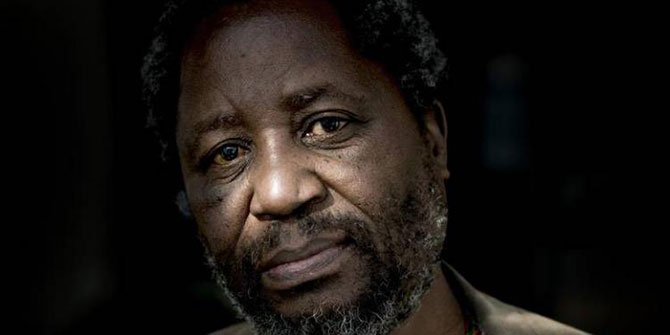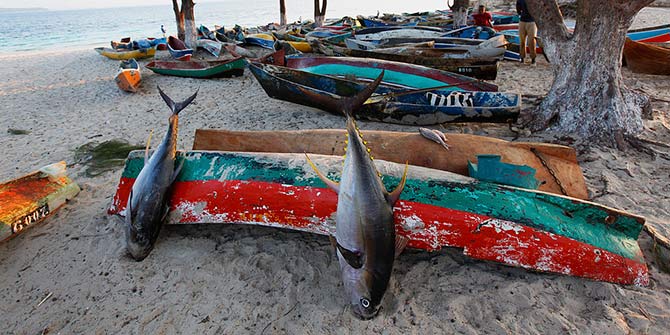LSE’s Ian Sprouse explains the decision of The Gambia to withdraw from the International Criminal Court through a retrospective on the rule of President Yahya Jammeh.
On 25 October 2016, The Gambia’s information minister, Sheriff Baba Bojang, announced the intention of the tiny West African country to withdraw from the International Criminal Court (ICC). Echoing Burundi’s claims, Mr Bojang accused the ICC of becoming an “International Caucasian Court for the persecution and humiliation of people of colour, especially Africans.” International press and organisations responded with concern after The Gambia, Burundi and South Africa announced their intentions to withdraw from the ICC.
This declaration should not be a surprise to those acquainted with the unusual behaviour of Yahya Jammeh, the sitting President for the past 22 years and considered by human rights groups to be one of Africa’s most brutal and unknown dictators. President Jammeh and his administration have developed a reputation for actions which often completely disregard established diplomatic customs and leave diplomats mystified. Indeed, ever since Mr Jammeh announced his discovery of a herbal cure for AIDS in 2007, his behaviour has often raised eyebrows. However, the progressively intemperate and threatening nature of his rule is cause for serious concern.

The Gambia’s declaration comes at a difficult time for the country. In recent years, The Gambia has seen increasing international coverage of its deteriorating human rights situation. The country has frequently drawn international criticism from non-governmental organisations and international powers for policies targeting freedom of the press, arbitrary arrest and detention, and violating the rights of LGBT persons. UN Special Rapporteurs on torture and extrajudicial executions visited The Gambia in 2014 and reported on the widespread use of torture and the death penalty in violation of international law. In response to continued human rights concerns, the US revoked The Gambia’s eligibility for the Africa Growth Opportunity Act in January 2015, to which the Gambian Government responded with congratulatory remarks stating they “never benefited from [AGOA] in the first place.” Despite continued international pressure, in May 2015 Mr Jammeh infamously threatened to slit the throats of gay men in the country, unequivocally stating they will never accepted in the country.
Historically, The Gambia has been immune from large-scale violent conflicts and civil strife that has rocked many of its West African neighbours. Nevertheless, political demonstrations were held in late April 2016 calling for electoral reform for the upcoming presidential elections in December. These protests were an unusual event in the country ruled by Mr Jammeh’s iron fist. Over the course of the protests, the government’s paramilitary police force arrested dozens of peaceful protesters including Ousainou Darboe, the leader of the largest opposition political party the United Democratic Party (UDP), and Solo Sandeng, another important UDP official. Shortly after Sandeng’s arrest, he mysteriously died in custody. Both Sandeng’s death and Darboe’s arrest prompted outrage among the public. The Gambia’s heavy-handed response to the peaceful protests sparked a massive international backlash, with the United Nations, ECOWAS, the EU, the US, and the African Commission on Human and Peoples’ Rights calling for an investigation into Sandeng’s death.
Despite the considerable (and growing) international pressure on The Gambia, President Jammeh has shown little interest in addressing – or even acknowledging – the human rights concerns of the international community. In March 2015, The Gambia only accepted 93 of the 171 recommendations at the UN Universal Periodic Review, the majority of which addressed significant human rights issues. Mr Jammeh’s administration continually disregards critics and has expelled UN, US, and EU diplomats. Most recently in 2015, he expelled European Union Chargé d’Affaires Agnes Guillard and followed with an unsuccessful formal request for the ICC to investigate the deaths of African migrants attempting to migrate to Europe via the Mediterranean Sea.
President Jammeh and his government have also found themselves at odds with authorities within Africa. Indeed, in 2015 Jammeh threatened to withdraw The Gambia from the African Union (AU) and stated that “if the AU plans to bring us back to the colonial era and slavery, we will break it into pieces.” The African Union has attempted to curtail Mr Jammeh and his administration in the past, although to little avail. In August 2012, Mr Jammeh announced his intention to execute all 47 death row inmates within by next month. The African Union responded by calling on Mr Jammeh to renounce his intention. However, despite this appeal, nine inmates were allegedly executed – three of them for treason, according to Amnesty International.
Interestingly, the main authority within the African Union responsible for protecting human rights and interpreting the African Charter on Human and Peoples’ Rights, the African Commission on Human and Peoples’ Rights (ACHPR) is headquartered in The Gambia. On 6 April Mr Sulayman Samba, Secretary-General for The Gambia (and now the Minister of Presidential Affairs), provided the opening remarks at the 58th Ordinary Session of the ACHPR in which he, according to the ACHPR, “underscored the progress made by the Islamic Republic of The Gambia in the promotion and protecting of human rights…” Eight days later, Mr Jammeh’s government arrested dozens of protesters on 14 and 16 April 2016, resulting in two deaths and prison sentences for top opposition political leaders. The Gambian government has not responded to ACHPR’s requests for a visit to the notorious Mile 2 Prison and an investigation into the deaths of political prisoners in custody. The last official communication from the ACHPR with respect to The Gambia’s long deteriorating human rights situation is from 2003 and the last ACHPR mission report is from 1999. All states party to the Charter are required to submit periodic reports of their implementation of the Charter every two years, yet The Gambia has 11 overdue reports. This begs the question, is the ACHPR truly holding The Gambia – its host country – accountable? I am not entirely convinced.
Within the African political sphere, ECOWAS has been one of the most vocal in their concern over The Gambia’s human rights abuses and political atmosphere. In 2011, election observers from ECOWAS boycotted monitoring the 2011 presidential elections on the grounds that the elections were not free and fair due to the political environment. In 2014, an ECOWAS court ruled that the Gambian government did not perform a meaningful investigation into the murder of a journalist, who frequently criticised Mr Jammeh.
It should not come as much of a surprise that an authoritarian leader in a country with a record of violating international human rights law has decided to withdraw from the very institution which prosecutes human rights violations, but why now and not sooner? Arguably, the timing of Burundi and South Africa’s exit presents a favourable narrative for Mr Jammeh’s administration: we’re not attempting to shirk human rights responsibilities or evade investigations, it’s simply a racist institution and we, like others in Africa, have had enough. Yet curiously (and suspiciously), all three nations have recently faced criticism for human rights violations, particularly Burundi which borders on an ICC investigation. Do the leaders feel that they can avoid an impending investigation by removing themselves from the ICC? Perhaps – it is very likely that Mr Jammeh would face an investigation and prosecution should he lose grip of the country; however, they would be wrong to assume that by leaving the ICC the international community will refrain from scrutiny where it is needed.
The ICC has been the subject of criticism from African leaders for years now, but leaving during a period of improving relations between the ICC and Africa is questionable, especially given that The Gambia’s very own former Minister of Justice, Fatou Bensouda, is the Court’s Chief Prosecutor. The narrative of racism that The Gambia and others push on the ICC certainly fits within The Gambia’s traditionally antagonistic views towards the West. These views have contributed to the West African country shifting its target donors of foreign aid from the West to countries typically more laissez-faire with strict governance requirements, such as the Middle East and China, which has recently increased its diplomatic presence in The Gambia. In addition to possibly avoiding further international investigation of its deplorable human rights record, The Gambia removing itself from the ICC is an opportunity for Mr Jammeh’s government to reinforce its intentions to counter Western influence and values within the country.
Furthermore, the continued negative press generated by the actions of President Jammeh and his administration poses a threat to its tourism industry, a major employer and driver of the economy accounting for approximately 15 per cent of the country’s GDP, which if lost, will only serve to further deteriorate the quality of life in the country. In any case, The Gambia’s decision to leave the ICC casts yet another shadow on its murky record of human rights and calls into question its commitment to protecting human rights within the country and the continent. The fact remains that nearly two million Gambians live under constant threat of arbitrary arrest and torture, and now with the apparent African exodus from the ICC and the seemingly ineffective response from other international organisations, they may be left wondering who is there to hold their leaders accountable.
Ian Sprouse is an MPA Candidate at LSE.
The views expressed in this post are those of the author and in no way reflect those of the Africa at LSE blog or the London School of Economics and Political Science.





